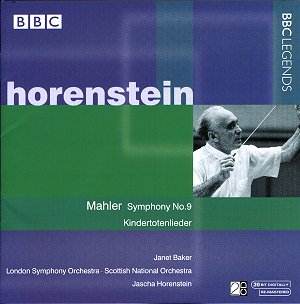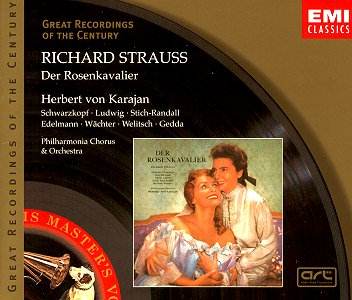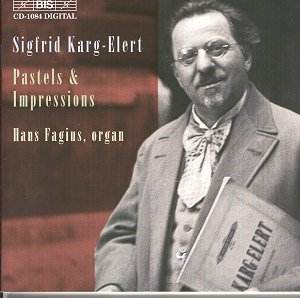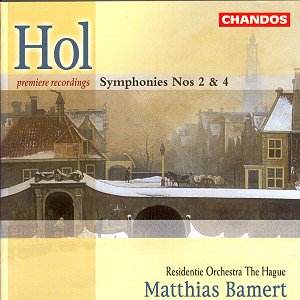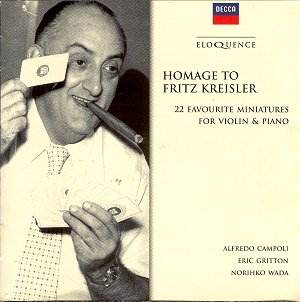 Composer: Fritz Kreisler
Composer: Fritz Kreisler
Works: Praeludium and Allegro, Liebesleid, Liebesfreud, Polichinelle-Serenade, Schön Rosmarin, Caprice Viennois, Tambourin Chinois, La Chasse, La Gitana, Minuet in G (Beethoven/Kreisler), Caprice in E flat, Caprice in A minor (Wieniawski/Kreisler), Danse Espagnole (Granados/Kreisler), Variations on a theme of Corelli (Tartini/Kreisler), Tango (Albeniz/Kreisler), Waltz in A flat (Brahms), Akatonbo, Jogashima no ame (Yamada/Campoli), Arioso (Bach), Ave Maria (Schubert), Rondo from Divertimento No 17 (Mozart/arr. Kreisler)
Performers: Alfredo Campoli, violin; Eric Gritton, piano; Norihko Wada, piano
Recording: London, 1955 and 1971 (last seven items)
Label: ELOQUENCE DECCA 466 666-2 [77.15]
Fritz Kreisler, a violinist and composer whose works blend the charm of light music with technical sophistication, has inspired countless interpretations of his beloved miniatures. This reissue of Alfredo Campoli’s recordings, spanning from the mid-20th century, serves as a poignant homage to Kreisler’s legacy, particularly during the centenary of the composer’s birth. Campoli, an eminent violinist of his time, captures the nuances of Kreisler’s style while also infusing his own interpretative flair, making this collection a significant addition to the catalog.
Campoli’s aesthetic throughout the recording is characterized by a sweet-toned, reflective approach that prioritizes lyrical expression over mere technical display. In the Praeludium and Allegro, he opts for deliberate phrasing, allowing each note to resonate with intention rather than rushing to the climactic passages that many contemporary performers might emphasize. This choice lends the performance a sense of introspective calm, a hallmark of Campoli’s artistry. The Liebesleid showcases his ability to convey profound affection through a slow tempo, where Gritton’s piano accompaniment complements the violin with an equally sensitive touch, creating a seamless dialogue that is both heartfelt and musically cohesive.
The recording quality, particularly in the 1955 sessions, captures the warmth of Campoli’s sound and the vibrant interplay with the piano. However, the later tracks with Norihko Wada, recorded in 1971, exhibit a more resonant acoustic, which somewhat veils Campoli’s exquisite tonal details. This is evident in the Albeniz Tango, where the lushness of the sound contrasts with the clarity found in earlier recordings. Nevertheless, Campoli’s lyrical phrasing and tasteful use of portamento remain consistent, particularly in the Arioso, where his unforced eloquence shines brightly, exemplifying his mastery of subtlety.
Throughout the album, Campoli demonstrates a remarkable control over tempo and dynamics. In pieces like Tambourin Chinois, he employs a slow pulse that may diverge from the more frenetic interpretations found in other recordings, yet this choice reinforces a sense of grace rather than urgency. Furthermore, the Caprice Viennois benefits from his clean articulation; he avoids excessive sliding, opting for a clear delineation of notes that enhances the piece’s inherent charm. Comparatively, other notable Kreisler recordings may boast a more flamboyant approach, yet Campoli’s restraint and careful consideration elevate the music’s lyrical qualities.
The historical context of these works comes alive through Campoli’s interpretations, which resonate with both nostalgia and a deep appreciation for Kreisler’s contributions to the violin repertoire. In the La Chasse, he manages to tackle the technical demands of the piece with aplomb, though one might argue that the performance lacks a certain galvanizing energy found in the renditions of his more exuberant contemporaries. However, this does not detract from the elegance he brings to La Gitana, where his tonal shadings and variegated dynamics are particularly praiseworthy.
Alfredo Campoli’s recordings pay tribute to Fritz Kreisler not just through the repertoire chosen but through a deeply personal interpretation that resonates with authenticity. While other recordings may offer more vibrant displays of virtuosity, Campoli’s renditions stand out for their sincerity and eloquence, qualities that define the essence of Kreisler’s music. This collection is not merely a nostalgic glance back at a bygone era but a reaffirmation of the enduring beauty of Kreisler’s works, as filtered through the artistry of one of the 20th century’s most beloved violinists.
